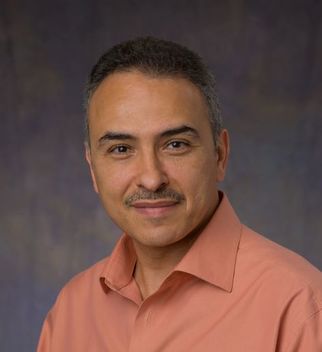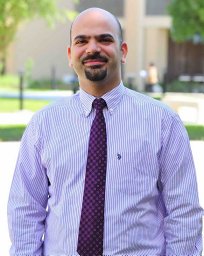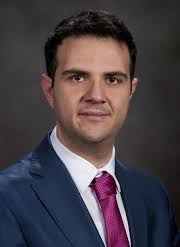TUTORIAL 1


Title: Enabling Technologies for Crowd Sensing and Management
Hossam Hassanein Nizar Zorba
Professor at Queens University Professor at Qatar University
Canada Qatar
Abstract: In this tutorial we will start with a literature review on the chronological order for IoT, crowd sensing and crowd management, with the objective to set a common underlying reference models. We will tackle and present recent efforts in data collection techniques, where the quality of the reported data highly faces tangible interoperability issues because it has been collected over heterogeneous sources. Such issues include inaccuracies, data-labelling inconsistencies, time-sensitivities and different reporting granularities and finally; how to infer information about the actual situations. Along the whole tutorial, we will highlight the different technologies that enable crowd sensing and management, and their availability in the market. In the last part of the tutorial we will comment on privacy issues, and how privacy is jeopardized in emergency situations where the accuracy level highly depends on the collected data. An interesting tradeoff privacy-accuracy will be described.
Short Bio:
Hossam Hassanein received the Ph.D. degree in computing science from the University of Alberta, Canada, in 1990. He is a leading authority in the areas of broadband, wireless and mobile networks architecture, protocols, control, and performance evaluation. His record spans more than 500 publications in journals, conferences, and book chapters, in addition to numerous keynotes and plenary talks at flagship venues. He is also the Founder and Director of the Telecommunications Research Lab, School of Computing, Queen's University, Kingston, ON, Canada, with extensive international academic and industrial collaborations. Dr. Hassanein is an IEEE Communications Society Distinguished Speaker and a past Chair of the IEEE Communication Society Technical Committee on AHSN. Dr. Hassanein is a Fellow of the IEEE and has received several recognitions and best papers awards.
Short Bio:
Nizar Zorba is a Professor at the Electrical Engineering department at Qatar University, Doha, Qatar. He has authored five international patents, two books, contributed to seven book chapters, and co-authored over 110 papers in peer-reviewed journals and international conferences. Dr. Zorba is associate/guest editor for the IEEE Communications Letters, IEEE Access, Springer Journal on Wireless Communications and Networking, IEEE Communications Magazine and IEEE Network. He is symposium chair at IEEE ICC 2019, workshop chair at IWCMC 2019 and track chair at IEEE GIIS 2018. Currently, he is the vice-chair of the IEEE ComSoc Communication Systems Integration and Modeling Technical Committee (TC CSIM).
TUTORIAL 2


Title: Information-Centric Vehicular Networking: Why and Wherefores, Challenges, and Design Guidelines
Azzedine Boukerche Rodolfo Coutinho
Distinguised University Professor, Canada Research Chair Researcher Fellow
University of OttawaUniversity of Ottawa
CanadaCanada
Abstract: We are witnessing the development of the new era of the vehicles’ evolution history: the era of connected and autonomous vehicles. In this new era, vehicles will be empowered with processing, sensing, actuators and wireless communication capabilities, which will support a wide range of vehicular applications to improving safety, efficiency and enjoyableness of transportation. In this revolution, processing and exchange of multimedia and big data will be fundamental. Therefore, content distribution is one of the critical challenges in connected cars and intelligent vehicular networks. In this tutorial, we will discuss the recent advancements and research directions towards the development of solutions for content distribution in connected cars and vehicular networks. We will highlight the current state-of-the-art and identify research opportunities that could interest researchers willing to contribute in different areas, such as vehicles’ mobility characterization and modeling, modeling and performance evaluation of information-centric networking in vehicular networks, broadcast storm avoidance of Interest and Data packets, content placement and cache policies, as well as networking protocols and architectures for service-oriented information-centric multimedia content distribution for vehicular networking and connected vehicles’ applications.
Short Bio:
Azzedine Boukerche (FIEEE, FEIC, FCAE, FAAS) is a Distinguished University Professor and holds a Canada Research Chair Tier-1 position with the University of Ottawa. He is founding director of the PARADISE Research Laboratory and the DIVA Strategic Research Centre, University of Ottawa. He has received the C. Gotlieb Computer
Medal Award, Ontario Distinguished Researcher Award, Premier of Ontario Research Excellence Award, G. S. Glinski Award for Excellence in Research, IEEE Computer Society Golden Core Award, IEEE CS-Meritorious Award, IEEE TCPP Leaderships Award, IEEE ComSoc ASHN Leaderships and Contribution Award, and University of Ottawa Award for Excellence in Research. He serves as an associate editor for several IEEE transactions and ACM journals, and is also a Steering Committee Chair for several IEEE and ACM international conferences. His current research interests include wireless ad hoc and sensor networks, wireless networking and mobile computing, wireless multimedia, QoS service provisioning, performance evaluation and modeling of large-scale distributed and mobile systems, and large scale distributed and parallel discrete event simulation. He has published extensively in these areas and received several best research paper awards for his work. He is a fellow of the Engineering Institute of Canada, the Canadian Academy of Engineering, the American Association for the Advancement of Science, and the IEEE.
Short Bio:
Rodolfo W. L. Coutinho is currently a Research Associate at University of Ottawa, Canada. He received his Joint/Dual Ph.D. degree in Computer Science in 2017 from the University of Ottawa, Canada, and the Federal University of Minas Gerais (UFMG), Brazil. He has received the 2018 Pierre Laberge Prize, for the best doctoral thesis in the Science and Engineering at the University of Ottawa and the 2018 CAPES
Award for the best thesis in the area of Computer Science in Brazil. He is also the recipient of the 2018 UFMG Best Thesis Award in Exact and Earth Science, and Engineering, the 2018 Best Thesis Award of the Brazilian Computer Society and the 2018 Best Thesis Award of the Brazilian Computer Networks and Distributed Systems Interest Group. He has served as TPC Co-Chair for the ACM MobiWac 2018, and ACM DIVANET 2017. His research interests include underwater sensor networks, vehicular information-centric networking, wireless ad hoc networking and mobile computing.
TUTORIAL 3

Title: Machine Learning for AI-Driven Wireless Networks: Challenges and Opportunities
Walid Saad
Professor at ECE, Virginia Tech
USA
Abstract: The goal of this tutorial is to provide one of the first holistic tutorials on the topic of machine learning for wireless network design. In particular, we will first provide a comprehensive treatment of the fundamentals of machine learning and artificial neural networks, which are one of the most important pillars of machine learning. After providing a substantial introduction to the basics of machine learning, we introduce a classification of the various types of neural networks that include feed-forward neural networks, recurrent neural networks, spiking neural networks, and deep neural networks. For each type, we provide an introduction on their basic components, their training processes, and their use cases with specific example neural networks. Then, we overview a broad range of wireless applications that can make use of neural network designs. This range of applications includes spectrum management, multiple radio access technology cellular networks, wireless virtual reality, mobile edge computing and caching, drone-based communications, the Internet of Things, and vehicular networks. For each application, we first outline the main rationale for applying machine learning while pinpointing illustrative scenarios. Then, we overview the challenges and opportunities brought forward by the use of neural networks in the specific wireless application. We complement this overview with a detailed example drawn from the state-of-the-art. Finally, we conclude by shedding light on the potential future works within each specific area and within the overall area of AI for wireless networks.
Short Bio: Walid Saad (S'07, M'10, SM’15) received his Ph.D degree from the University of Oslo in 2010. Currently, he is an Associate Professor at the Department of Electrical and Computer Engineering at Virginia Tech, where he leads the Network Science, Wireless, and Security (NetSciWiS) laboratory, within the Wireless@VT research group. His research interests include wireless networks, machine learning, game theory, cybersecurity, unmanned aerial vehicles, and cyber-physical systems. Dr. Saad is the recipient of the NSF CAREER award in 2013, the AFOSR summer faculty fellowship in 2014, and the Young Investigator Award from the Office of Naval Research (ONR) in 2015. He was the author/co-author of six conference best paper awards at WiOpt in 2009, ICIMP in 2010, IEEE WCNC in 2012, IEEE PIMRC in 2015, IEEE SmartGridComm in 2015, and EuCNC in 2017. He is the recipient of the 2015 Fred W. Ellersick Prize from the IEEE Communications Society and of the 2017 IEEE ComSoc Best Young Professional in Academia award. From 2015-2017, Dr. Saad was named the Stephen O. Lane Junior Faculty Fellow at Virginia Tech and, in 2017, he was named College of Engineering Faculty Fellow. He currently serves as an editor for the IEEE Transactions on Wireless Communications, IEEE Transactions on Communications, IEEE Transactions on Mobile Computing, and IEEE Transactions on Information Forensics and Security.
TUTORIAL 4

Title: Data analytics of mobility entities
Antonio Loureiro
Professor at UFMG
Brazil
Abstract: Currently, we have a huge amount of geo-referenced data (e.g., GPS records, cell phone data records, and geo-tagged social media) generated by humans and different sorts of vehicles. Such data provides fundamental observations about human activities and behaviors. The knowledge extraction from these data can offer unprecedented opportunities in different areas such as social and economic progress, urban planning, smart cities, and service provision. These are examples that can benefit from such analysis of this large data collection. In this tutorial, we will present and discuss what can be accomplished from the analysis of this mobility data considering different types of mobility data and the corresponding data analytics techniques.
Short Bio: Antonio A. F. Loureiro is a full professor at UFMG, where he leads the research group on mobile ad hoc networks. He received his B.Sc. and M.Sc. degrees in computer science from UFMG, and his Ph.D. degree in computer science from the University of British Columbia, Canada. He was the recipient of the 2015 IEEE Ad Hoc and Sensor (AHSN) Technical Achievement Award. He is a regular visiting professor and researcher at the PARADISE Research Laboratory at the University of Ottawa and is an international research partner of DIVA Strategic Research Networks. His main research areas include wireless sensor networks, mobile computing, and distributed algorithms. In the last 10 years, he has published regularly in international conferences and journals related to those areas, and has also presented tutorials at international conferences.